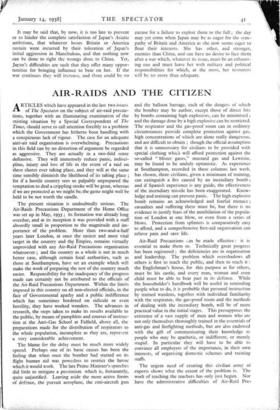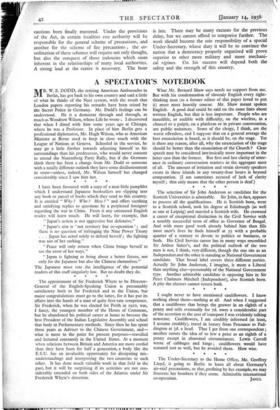AIR-RAIDS AND THE CITIZEN
ARTICLES which have appeared in the last two issues of The Spectator on the subject of air-raid precau- tions, together with an illuminating examination of the existing situation by a Special Correspondent of The Times, should serve to call attention forcibly to a problem which the Government has hitherto been handling with a conspicuous lack of vigour. The case for an adequate anti-air raid organisation is overwhelming. Precautions in this field can by no distortion of argument be regarded as aggressive. They are actually in a two-fold sense defensive. They will immensely reduce panic, indisci- pline, injury and loss of life in the event of a raid on these shores ever taking place, and they will at the same time sensibly diminish the likelihood of its taking place ; for if a hostile country sees us palpably unprepared the temptation to deal a crippling stroke will be great, whereas if we are protected as we might be, the game might well be held to be not worth the candle.
The present situation is undoubtedly serious. The Air-Raids Precautions Department of the Home Office was set up in May, 1935 ; its formation was already long overdue, and at its inception it was provided with a staff absurdly small in proportion to the magnitude and im- portance of the problem. More than two-and-a-half years later London, at once the easiest and most vital target in the country and the Empire, remains virtually unprovided with any Air-Raid Precautions organisation whatsoever ; and the country as a whole is not in much better case, although certain local authorities, such as those at Southampton, have set an example which will make the work of preparing the rest of the country much easier. Responsibility for the inadequacy of the progress made can certainly not be attributed to the officials of the Air-Raid Precautions Department. Within the limits imposed in this country on all non-elected officials, in the face of Governmental apathy and a public indifference which has sometimes bordered on ridicule or even hostility; they have worked wonders. The advances in research, the steps taken to make its results available to the public, by means of pamphlets and courses of instruc- tion at the Anti-Gas School at Falfield, above all, the preparations made for the distribution of respirators to the whole population, incomplete as they are, represent a very considerable achievement.
The blame for the delay must be much more widely spread. Perhaps one of its basic causes has been the feeling that when once the bomber had started on its flight human aid was powerless to restrict the havoc which.it would work. The late Prime Minister's speeches did little to mitigate a pessimism which is, fortunately, quite unjustified. Leaving aside the more active forms of defence, the pursuit aeroplane, the anti-aircraft gun and the balloon barrage, each of the dangers of which the bomber may be author, except those of direct hits by bombs containing high explosives, can be minimised ; and the damage done by a high explosive can be restricted. The respirator and the gas-proof room can in ordinary circumstances provide complete protection against gas, high concentrations of which are alone really dangerous, and are difficult to obtain ; though the official assumption that it is unnecessary for civilians to be provided with special clothing which will afford protection against the so-called " blister gases," mustard gas and Lewisite, may be found to be unduly optimistic. As experience at Southampton, recorded in these columns last week, has shown, three civilians, given a minimum of training, can extinguish a fire caused by an incendiary bomb ; and if Spanish experience is any guide, the effectiveness of the incendiary missile has been exaggerated. Know- ledge and training can prevent panic. The high explosive bomb remains an acknowledged and fearful menace ; casualties and suffering there must be, but there is no evidence to justify fears of the annihilation of the popula- tion of London at one blow, or even from a series of blows. Protection from splinters is comparatively easy to afford, and a comprehensive first-aid organisation can relieve pain and save life.
Air-Raid Precautions can be made effective : it is essential to make them so. Technically great progress has been registered ; the deficiencies are in organisation and leadership. The problem which overshadows all others is first to reach the public, and then to teach it : the Englishman's house, for this purpose as for others, must be his castle, and every man, woman and even child must be able to bear part in its defence. While the householder's handbook will be useful in reminding people what to do, it is probable that personal instruction by trained wardens, together with individual familiarity with the respirator, the gas-proof room and the methods of dealing with the incendiary bomb, will be of more practical value in the initial stages. This presupposes the existence of a vast supply of men and women who are not only themselves thoroughly trained in the essentials of anti-gas and firefighting methods, but are also endowed with the gift of communicating their knowledge to people who may be apathetic, or indifferent, or merely stupid. In particular they will have to be able to convince all employers of the importance, in their own interests, of organising domestic schemes and training staffs.
The urgent need of creating this civilian army of experts shows what the extent of the problem is. The work of teaching the teachers has only just begun. Nor have the administrative difficulties of Air-Raid Pre- cautions been finally mastered. Under the provisions of the Act, in certain localities one authority will be responsible for the general scheme of precautions, and another for the scheme of fire precautions ; the co- ordination of these schemes will require not only thought, but also the conquest of those jealousies which seem inherent in the relationships of many local authorities. A strong lead at the centre is necessary. The hour is late. There may be many excuses for the previous delay, but we cannot afford to temporise further. The work should become the sole responsibility of a special Under-Secretary, whose duty it will be to convince the nation that a democracy properly organised will prove superior to other more military and more mechani cal regimes. On his success will depend both the safety and the strength of this country.







































 Previous page
Previous page